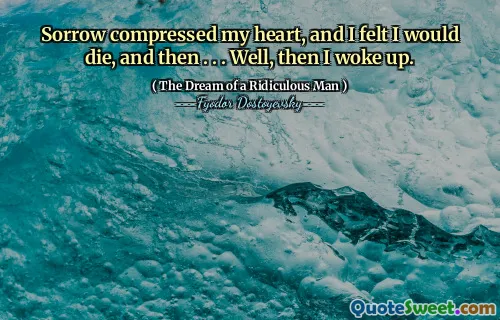"The Dream of a Ridiculous Man" is a short story by Fyodor Dostoevsky that explores themes of meaning, redemption, and the nature of existence. The protagonist, a self-proclaimed ridiculous man, grapples with profound nihilism and despair. He ultimately contemplates the futility of life in a society filled with greed and selfishness, leading him to a deep existential crisis. As the story progresses, the protagonist experiences a dream that opens his eyes to an ideal world, contrasting sharply with the harsh realities he faces in his waking life. This dream serves as a transformative experience, allowing him to envision a society governed by love and compassion. It lays the groundwork for personal redemption and deeper understanding. Upon awakening, the protagonist is changed; he resolves to embrace life and contribute positively to society. This shift from despair to hope emphasizes the potential for personal change and the power of dreams in shaping our reality. Dostoevsky's exploration of these themes invites readers to reconsider their perspectives on life and the possibilities for human connection and empathy.
"The Dream of a Ridiculous Man" is a short story by Fyodor Dostoevsky that explores themes of meaning, redemption, and the nature of existence. The protagonist, a self-proclaimed ridiculous man, grapples with profound nihilism and despair. He ultimately contemplates the futility of life in a society filled with greed and selfishness, leading him to a deep existential crisis.
As the story progresses, the protagonist experiences a dream that opens his eyes to an ideal world, contrasting sharply with the harsh realities he faces in his waking life. This dream serves as a transformative experience, allowing him to envision a society governed by love and compassion. It lays the groundwork for personal redemption and deeper understanding.
Upon awakening, the protagonist is changed; he resolves to embrace life and contribute positively to society. This shift from despair to hope emphasizes the potential for personal change and the power of dreams in shaping our reality. Dostoevsky's exploration of these themes invites readers to reconsider their perspectives on life and the possibilities for human connection and empathy.
More »
Today Birthdays
1729 -
Edmund Burke
1949 -
Haruki Murakami
1954 -
Howard Stern
1876 -
Jack London
1993 -
Zayn Malik
1951 -
Kirstie Alley
1863 -
Swami Vivekananda
1923 -
Alice Miller
1987 -
Naya Rivera
1825 -
Brooke Foss Westcott
1944 -
Joe Frazier
1951 -
Rush Limbaugh
1964 -
Jeff Bezos
1978 -
Jeremy Camp
1628 -
Charles Perrault
1856 -
John Singer Sargent
1970 -
Kaja Foglio
1953 -
Rick Santelli
1986 -
Gemma Arterton
1968 -
Raf Simons
1958 -
Christiane Amanpour
1966 -
Olivier Martinez
1996 -
Ella Henderson
1917 -
Maharishi Mahesh Yogi
1949 -
Ottmar Hitzfeld
1928 -
Ruth Brown
1968 -
Heather Mills
1946 -
George Duke
1968 -
Rachael Harris
1923 -
Ira Hayes
